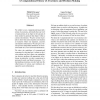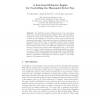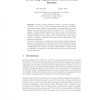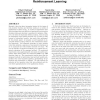112
click to vote
CDC
2008
IEEE
15 years 9 months ago
2008
IEEE
—The focus of the work in this paper is the construction and analysis of a dynamical system model for human decision making in sequential two-choice tasks. In these tasks, a huma...
220
click to vote
TARK
2009
Springer
15 years 9 months ago
2009
Springer
We exhibit a new computational-based definition of awareness, informally that our level of unawareness of an object is the amount of time needed to generate that object within a ...
ROBOCUP
2009
Springer
15 years 9 months ago
2009
Springer
The high-level decision making process of an autonomous robot can be seen as an hierarchically organised entity, where strategical decisions are made on the topmost layer, while th...
118
click to vote
ESAW
2009
Springer
15 years 9 months ago
2009
Springer
Artificial agents, people, institutes and societies all have the ability to make decisions. Decision making as a research area therefore involves a broad spectrum of sciences, ran...
130
click to vote
ECSQARU
2009
Springer
15 years 9 months ago
2009
Springer
Decision making amounts to define a preorder (usually a complete one) on a set of options. Argumentation has been introduced in decision making analysis. In particular, an argumen...
105
click to vote
ATAL
2009
Springer
15 years 9 months ago
2009
Springer
As agents begin to perform complex tasks alongside humans as collaborative teammates, it becomes crucial that the resulting humanmultiagent teams adapt to time-critical domains. I...
124
click to vote
ATAL
2009
Springer
15 years 9 months ago
2009
Springer
Distributed constraint optimization (DCOP) provides a framework for coordinated decision making by a team of agents. Often, during the decision making, capacity constraints on age...
0
posts
with
0
views
0
views
 Homepage
Homepage 117
click to vote
KDD
2002
ACM
16 years 3 months ago
2002
ACM
Recently, there has been increasing interest in the issues of cost-sensitive learning and decision making in a variety of applications of data mining. A number of approaches have ...





